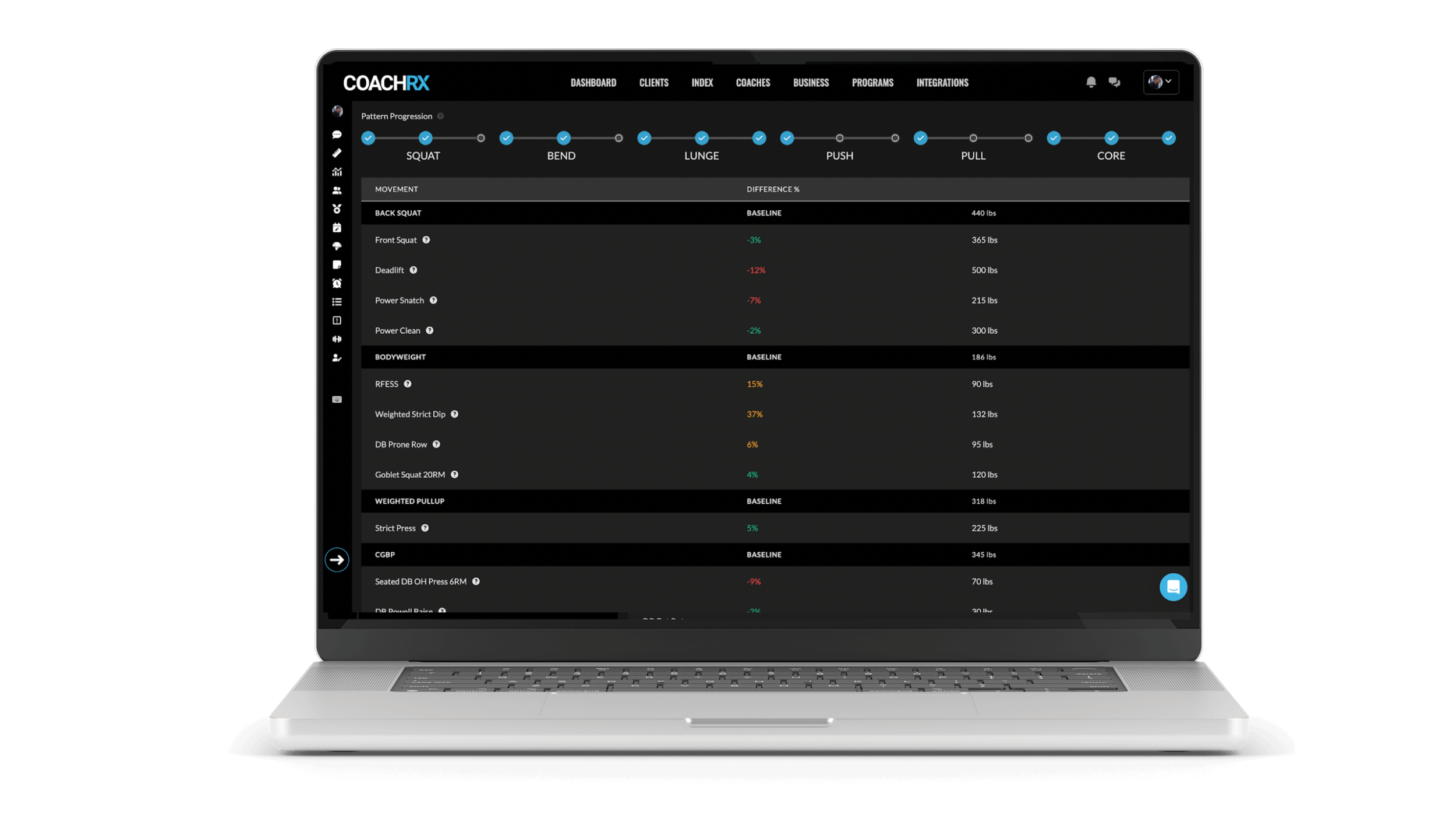ASSESSING AND TRACKING PROGRESS MADE EASY WITH COACHRX
If you’re not assessing, you’re guessing.That’s a guiding principle of the CoachRx systems, and with good reason.
If you’re a coach, your job is to help your clients see tangible results. And the most effective way to do this is to figure out where they are now before determining how to get them where they want to go. And this requires data.
Enter the CoachRx assessment: (We include the systems taught in the OPEX Coaching Certificate Program, but you can also add your own). The assessment process puts clients through various tests to determine where they’re at now, and then the coach can use this data to determine priorities and a plan of attack to move them along the continuum to better health and fitness.Best of all, CoachRx makes doing this incredibly easy for the coach, so you no longer have to feel like you’re faking it or guessing what’s best for each client.WHAT IS THE OPEX ASSESSMENT AND FITNESS MONITORING EXERCISES IN COACHRX?
The OPEX assessment (and what you’ll see in CoachRx for each client) is broken into three main pieces:OPEX BodyOPEX MoveOPEX Work
OPEX Body: This is an analysis of the client’s height, weight, lean body, and fat mass.OPEX Move: This involves a series of motor control tests across the six movement patterns: squat, bend, push, pull, lunge and core. The movement assessment will determine the client’s capabilities and influence the priorities for programming.OPEX Work: This involves putting the client through some basic energy system testing. We recommend the 10 minute Airbike for max calories as a simple work capacity test for beginners to establish a baseline.In Practice: Once the client completes the various components of the assessment process, all of their data is easily entered and stored in CoachRx in the assessment section, making it easy for you (and them) to access if need be.
It also makes re-testing and monitoring their progress later a lot easier, as you or the client is no longer searching through old Google Sheets to see how they did on the last 10-minute bike test or left side plank test.WHAT ARE FITNESS MONITORING EXERCISES (FMES)?
Similarly, FMEs are benchmark tests that allow us to monitor a client’s progress, and their ability to advance to the next level of fitness. CoachRx provides both energy systems and resistance FMEs we commonly use, but you also have the ability to create your own benchmarks for your clients.More specifically, when it comes to energy system FMEs, CoachRx provides common beginner, intermediate and advanced tests (as well as what is required to graduate to the next level), and you can add new results at any time and even graph these results over time to monitor the client’s progress. For resistance training, CoachRx provides a detailed system of strength endurance and max contraction FMEs for each movement pattern. This helps you progress your client appropriately from motor control to strength endurance to max contractions to avoid fast-tracking and keep them safe. For example, when progressing the squat pattern, you want to ensure your client has achieved motor control in the air squat and strength endurance in the 20rm goblet squat, before you test a 1rm in the back squat. Or before testing a deadlift 1rm, you want to ensure your client can hold a sorenson for at least 2 minutes. Further, CoachRx also provides you and your clients with their structural balance insights (based on their FME scores). This is incredibly useful for the coach, as it helps let you know left to right, upper and lower, and exercise to exercise imbalances, which can then inform priorities in program design.For example, the deadlift should be approximately 125% of the back squat 1rm. If it’s higher or lower, you know whether to prioritize the bend or the squat pattern.
Further, CoachRx provides a simple color-coded system to help you easily identify imbalances. Balanced= within 5% of goalOver Goal= more than 5% over the goalUnder Goal= less than 5% under the goal
When you prescribe these tests in a workout you can link the exercise to the FME so CoachRx automatically tracks and stores the data point. Your clients can even view their FME history and progress from the client mobile app.
TAKING ADVANTAGE OF COACHRX DURING THE ASSESSMENT PHASE
Sometimes programming for a brand new client can be the most challenging.
Sure, you have their assessment data, but you haven’t seen them follow a program yet, and they don’t necessarily totally trust your prescriptions yet.
CoachRx provides an added layer of support.In short, when you’re inputting your client’s assessment data, CoachRx will offer tips.For example, if the client failed the squat or lunge test, CoachRx will ask you to identify the main fault, as well as a potential cause for this fault. You might choose something like “lack of strength” or “glute issue.” After that, CoachRx will spit out priorities to guide you in your exercise prescription, providing you a little help and some peace of mind that you’re on track.
WHY IT’S BETTER THAN ANYTHING ON THE MARKET
Not only does CoachRx make inputting and storing assessment and FME data easy, but it’s the only app on the market that actually interprets the data and provides insights and tips as to how you should proceed when it comes to designing effective exercise prescriptions.And, for a client’s perspective, there’s no other app out there that tracks their progress—and can provide them with progress graphs—along their fitness journey, helping them see just how far they have come.
Best of all, this really is a blessing to the coach, who finds themselves constantly explaining to a frustrated client that progress takes time and that even if they still don’t have a pull-up, they have improved their pulling strength. Now the client can see the numbers, witness the progress, and remain motivated and committed for the long-term with you (music to a coach's ears).


